- Home
- Jojo Moyes
Sheltering Rain Page 2
Sheltering Rain Read online
Page 2
Joy couldn't speak. She simply looked at him in mute horror, and then buried her face, now flooded with embarrassment, in her glass. Perhaps, she prayed, suddenly, uncomfortably sober, when she looked up, he would be gone.
"Would you like a handkerchief?"
Joy kept her face down, staring grimly at her too-tall shoes. Something unmentionable was stuck in her throat, refusing to descend despite her repeated attempts to swallow.
"Look. Here. Take it."
"Please go away."
"What?"
"I said, please go away." Oh, God, if she didn't leave soon, her mother would come out to find her, and discover her. And then all hell would break loose; she could hear the chapters ahead: 1. She Was Not Fit to Be Taken Anywhere; 2. The Shame of Her Behavior, or Why Couldn't She Be More Like Stella?; 3. What Would People Think?
"Please. Please just go."
Joy was aware that she sounded rude, but the horror of possible discovery, as well as being stuck there having to make polite conversation while there might be goodness-knows-what splashed on her blouse--on her face--made it seem a lesser ill.
There was a lengthy pause. The sound of loud exclamations, overlapping, rose and fell from the dining room.
"I don't think--I think it would be better if somebody kept you company for a bit." It wasn't a young voice, not the excitable braying tones of most of the officers; yet it didn't have the basso profundo of a lengthy association with power. He couldn't be higher than officer rank.
Why doesn't he go? thought Joy.
But he just stood there. His immaculate trousers, she noted, had a small splash of something orange on the left shin.
"Look, I'm much better now, thank you. And I really would rather you left me now. I think I might go home." Her mother would be furious. But she could say she had felt ill. It wouldn't be an outright lie. It was only this man who would know the truth.
"Let me escort you," he said.
There was another buildup of noise from inside, and some high, slightly hysterical laughter. A jazz recording began and ended just as abruptly.
"Please," he said. "Take my hand. I'll help you up."
"Will you please just leave me alone?" This time her voice sounded harsh, even to her own ears. There was a brief silence, and then, after a never-ending, breathless pause, she heard the sound of his footfall on the terrace as he walked slowly indoors.
Joy was too desperate to feel ashamed for long. She stood, took a long draft of the ice water, and then walked briskly, if a little shakily, toward the house. With a bit of luck, she could tell the staff and escape while they were all listening. But as she walked past the doorway of the drawing room, guests were already beginning to filter out. A teary-eyed Stella, the corners of her eyes drawn down in disappointment, was among the first.
"Oh, Joy, can you believe it?"
"What?" said Joy, dumbly, wondering how quickly she could walk past her.
"The bloody, bloody wireless. What a day for it to break. I can't believe they've got only one in the house. Surely everybody's got more than one wireless."
"No need to fret, Stella, dear," said Duncan Alleyne, one hand fingering his mustache, the other lingering on Stella's shoulder just a little too long for his professed brand of paternal interest. "It won't take long for one of the men to go and fetch one from the Marchants' house. You'll hardly miss a thing."
"But we'll miss the whole beginning. And we'll never get to hear it again. There probably won't even be another coronation in our lifetime. Oh, I can't believe it." Stella was properly crying now, oblivious to the guests around her, some of whom had evidently regarded the sacred ceremony of kings as a rather irritating interruption to a perfectly good party.
"Stella--I've got to go," Joy whispered. "I'm really sorry. I'm not well."
"But you can't--at least stay until they've got the wireless."
"I'll call for you tomorrow." Swiftly, seeing that her parents were still in the group that sat unnoticing around the dead wireless, Joy ran for the door. Nodding briefly to the boy who let her out, Joy was out, alone in the damp night air, with only the whining dive-bomb of the mosquitoes to keep her company, and the faintest of misgivings about the man she had left behind.
The expatriates of Hong Kong were used to living well, with an almost nightly schedule of drinks and dinners, so it was not uncommon for there to be few gweilo faces around first thing in the morning. But Joy, whose unfortunate accident with the pink drinks had left her feeling remarkably clearheaded on waking, found herself in the rare position of being a minority of one.
It was as if the whole of the Peak were suffering a hangover. While pairs of Chinese men and women trod softly past, some bearing heavy baskets or dragging trailers of rubbish, there was not a white person to be seen. Outside the white-painted houses, set back from the road, streams of colored bunting hung apologetically, and pictures of the smiling princess curled from windows, looking themselves exhausted from the excesses of the night before.
Padding around the teak-floored apartment, both she and Bei-Lin communicating in whispers (neither wanted to wake Alice and Graham, whose feverish, rambling arguments had stretched long into the early hours), she had decided the only thing for it was a trip to the New Territories so that she could go riding. Everyone would be spiky-headed and miserable today; and the wet heat pressed down harder than ever, magnifying hangover headaches, and ensuring that the day would be spent in a bad-tempered torpor, stretched out under fans on the soft furnishings. It was not a day to be in town. The problem Joy faced was that this was the one morning in which there was no one around to take her out of it.
She had walked to Stella's at around ten, but the curtains had been drawn, and she hadn't liked to call in. Her own father, who could usually be relied upon to drive his princess, would be unlikely to rise before midday. Not having many friends, there was no one else she felt comfortable calling upon. Seated on a wicker chair by the window, Joy toyed with the idea of taking a tram to the center of town, and then catching a train, but she had never done it alone and Bei-Lin had refused to accompany her, knowing that the mistress would be in an even fouler temper if she awoke to find the help had gone off on a "jaunt." "Oh, God save the bloody Queen," muttered Joy at her retreating back.
Not for the first time, Joy felt mutinous at the restrictions of her life, both geographical and physical. In the short time she and her mother had lived in Australia, shortly after the Japanese had invaded and the women and children had left the colony, Joy had found herself the recipient of unheard-of freedoms. They had stayed with Alice's sister, Marcelle, the doors of whose beachfront house had seemed permanently open, free for Joy to walk out, and for a variety of neighbors, all of whom seemed so relaxed and cheerful compared with those in Hong Kong, to walk in.
Alice had been relaxed there, too, had blossomed in the dry heat, where everyone spoke her language and the tall, bronzed men flirted disgracefully. There, Alice's manners had been the peak of refinement, her clothes so far beyond anything they had seen, and she could appear as she had wanted to appear: chic, cosmopolitan, exotic by way of her exile. Plus, Marcelle was younger than Alice, and enjoyably deferential in all matters of taste and style. This elevated sense of goodwill had meant that Alice had been much less "bothered" by Joy than usual, had waved her off to the beach or to the mall with barely a backward look, unlike in Hong Kong, where she was permanently preoccupied with the deficiencies of Joy's appearance, manners, and the potential dangers, in an uncivilized country, of letting her out on her own.
"I hate my life," she said out loud, letting her thoughts flood out and hang, like brooding clouds, in the air before her.
"Ma'am?"
It was Bei-Lin, standing in the doorway. "There is a gentleman to see you."
"For my mother?"
"No, ma'am. He ask for you." She grinned, meaningfully.
"You'd better show him in."
Frowning, Joy smoothed back her hair and stood. Company was the
last thing she wanted.
The door opened, and in walked a man she had never seen before, dressed in a white, short-sleeved shirt, and cream-colored trousers. He had short, neatly cut, reddish hair, a longish, patrician face, and pale blue eyes. He was also tall, and stooped unnecessarily, seemingly out of habit, as he came through the door. Naval, she thought, abstractly. They always stooped through doorways.
"Miss Leonard." He held a straw hat in front of him, clutching it with both hands.
Joy looked blankly. She couldn't work out how he might know her name.
"I'm Edward Ballantyne--sorry if this is an imposition. I just wanted--I just thought I'd see how you were."
Joy gazed at his face, and suddenly flushed with appalled recognition. She had seen that face only in duplicate before. Her hand rose unconsciously to her mouth.
"I took the liberty of asking your friend your name and address. I just wanted to make sure you got home safely. I felt rather guilty about letting you go on your own."
"Oh, no," said Joy, looking determinedly down at her feet. "I was fine. You're very kind," she added, after a pause, aware that she was being rude.
They stood for some minutes, until Joy realized uncomfortably that he wasn't going to offer to leave. She felt so uncomfortable that her skin had begun to prickle. She had never been so embarrassed as she had been last night, and now it was repeating on her, like a too-strong taste. Why couldn't he just leave her alone? Leave her to her private humiliation? Bei-Lin kept loitering anxiously in the doorway, but Joy studiously ignored her, damned if she was going to offer him a drink.
"Actually," he said, after a lengthy pause, "I was wondering whether you would like to go for a walk. Or a game of tennis. Our commander has been given special permission to use some courts down by Causeway Bay."
"No, thank you."
"Perhaps I could ask you to show me some of the local sights? I've never been to Hong Kong before."
"I'm very sorry, but I was just on my way out," said Joy, who found she still couldn't look at him.
There was a long pause. He was definitely staring at her. She could feel it.
"Anywhere nice?"
"What?" Joy felt her heart thumping against her chest. Why wouldn't he go?
"You said you were going out. I just wondered . . . well, where?"
"I'm going riding."
"Riding?" Here she looked up, hearing the eagerness in his voice. "Are there horses here?"
"Not here," she said. "Not on the island, anyway. In the New Territories. A friend of my father's runs a stables up there."
"Would you mind if I tagged along? I ride a bit back home. Miss it terribly. In fact, I haven't seen a horse for nine months."
He said it in the wistful way that most servicemen talked about their families. His whole face, she realized, had sort of opened out, all the rather severe planes of it softening and lifting. He was, she had to admit, terrifically handsome, in a grown-up sort of way.
But he had watched her disgracing herself over the balcony.
"I've got a car. I could drive you. Or, just follow you, if that was more--er--convenient."
Joy knew her mother was bound to be horrified when Bei-Lin told her that Miss Joy had disappeared in a car with a strange man, but the aftershocks probably wouldn't be that much worse than if she had stayed under her feet all day, providing a verbal punching bag for Alice's hangover. And there was something rather delicious about skimming along the quiet roads with this strange, tall, freckled man, who, rather than making her feel awkward and clumsy with words, as most officers did, simply talked and talked himself, about his horses in Ireland (curiously, he didn't have an Irish accent), the wildness of the hunting country where he lived, and, by contrast, the endless claustrophobic boredom of being confined to ship, stuck in the same tiny world, with the same people, for months and months at a time.
She had never heard a man talk as he talked, free of the endless clipped observations that characterized most of the officers she spoke to. Edward's speech was uncluttered and frank. He spoke like someone deprived of language for a long time, whole sentences coming out in gasps, like a drowning man gulping at air, and his laughter punctuated his sentences with huge, bellied guffaws. Then periodically he would stop, glance at her as if embarrassed by his own lack of reticence, and be quiet until the next thought bubbled out of him.
Joy found herself laughing, too, at first shyly, her own self gradually liberated by this strange man, so that by the time they arrived at the stables she was glowing and giggling in a way totally alien to her. After a forty-minute absence, Alice would not have recognized this daughter at all. In fact, Joy hardly recognized her, sneaking glances at the man next to her, averting her eyes coyly when he met hers, generally behaving--well--like Stella.
Mr. Foghill said he would let him ride. Joy had been secretly hoping he would, and once Edward had stood in the small yard with him, talking in reverent tones of great hunters he had known, and agreeing on the evident superiority of Irish bloodstock over English, the little widower had lost all his initial stiffness, and even recommended his own horse, a towering young chestnut with a crafty buck. He had demanded Edward take him around the manege for a couple of circuits, just to check on his seat and hands, but what he saw evidently satisfied him, for they were then riding slowly out of the gates, and up the road toward the open country.
By this stage, Joy didn't know what had come over her. She found it impossible to stop smiling, and nodding, and yet was struggling to properly hear anything he said, above this unfamiliar pounding in her ears. She was grateful to be able to hold on to the reins, and legitimately gaze at the long gray neck in front of her, stooping and rising in time with the sound of hoof fall, because she couldn't quite concentrate on anything. She felt simultaneously distant from everything around her, and acutely aware of the smallest thing. Like his hands. And his freckles. And the way he got two lines in the side of his jaw when he smiled. She didn't even notice when the mosquitoes zoomed in back on her neck, trapping themselves under her tied-back hair, and feasting on pale and tender flesh.
Best of all, he could ride. Properly ride, in that he sat tall and relaxed in the saddle, his hands moving gently backward and forward so that his reins didn't pull back against the horse's mouth, one occasionally reaching forward to stroke, or to bat an unsuspecting fly away. Joy had been to the stables only with one other man she had liked, a shy banker friend of her father's, and her fragile crush had dissipated like smoke on the wind when she saw him lurching around on the horse's back, unable to hide his fear when the horse moved into a slow trot. William she didn't even want to bring near. There was nothing to put you off a man like seeing him on a horse. It was only now, however, that Joy realized the potent appeal of a man who could ride well.
"Ever been to Scotland?" said Edward.
"What?"
"These mosquitoes. They're like midges," he said, slapping the back of his own neck. "Bite you anywhere."
Joy blushed and looked down. They rode on.
The sky grew darker, and sank lower, so that Joy was unsure whether it was the damp air or sweat soaking her clothes and making stray pieces of grass and seeds stick to her skin. The atmosphere seemed to muffle everything, cloaking the sound of the horses' hooves as if they were wrapped in flannel, enclosing them both in a warm, wet blanket. Above them, high against the backdrop of Lion Mountain, even the buzzards seemed to hang in the air like black drops of moisture, as if movement itself were too much of an effort, while the leaves that brushed against her boots left trails of water, despite the lack of rain.
If he noticed her thoughts careering chaotically, or picked up on the fact that she blushed repeatedly, found it hard to speak, or that her horse kept taking advantage of her absent-mindedness to snatch the odd mouthful of shrubbery, he said nothing. She became more composed when they cantered along a bridle path alongside a paddy field, and again when he pulled up at a roadside shack in order to get her a quarter of watermel
on, but it was apparent only in that she could now gaze at him without embarrassment. It was at this point that she realized her ribbon had come out, and that her hair hung in ungroomed, sweaty strands around her shoulders. But if he noticed that, he didn't show it, either, and merely reached out, as he handed her his handkerchief, in order to push a piece away from her face. She felt the shock of that touch electrify her skin for minutes after.
"You know, Joy, I've had the best time," he said, meditatively, as they walked the horses back toward the yard. "You don't know what it's meant to me, being able to ride."
Joy was conscious that at some point she was going to have to speak, but she felt that if she opened her mouth, she would say something gauche and inappropriate, or, worse, that she would somehow reveal this strange, aching longing that had sprung out of nowhere. If she said nothing, what was the worst he could think of her?
"I don't know many girls who can ride, either. At home, the girls in my village are, shall we say, a little on the beefy side. Village girls. Not the kind I'd normally ride with, anyway. And wherever we dock, the only ones I meet want to go to cocktail parties and be witty, and to be honest I'm not much cop at all that stuff. I had a girl once--and she was a bit like you--but she . . . well. That's all gone. And I haven't met anyone who I could actually relax with for an absolute age."
Oh, but Joy wanted to kiss him. I know, I know, she wanted to shout. I feel that way, too. I feel all the things you feel. But she just smiled and nodded, sneaking glances at him from under her wet hair, simultaneously berating herself for her sudden transformation into the kind of girl she had always despised. She didn't know what she wanted in a man (it had never occurred to her that it was up to her to do the wanting), and now she found herself drawn to him not because of specific qualities, but because of a whole list of negatives: his ability not to make her feel awkward; the fact that he didn't look like a sack of rice on a horse; his tendency not to look at her as though he wished she were someone else. Something swelled and grew in Joy; it was bigger than nausea, but just as incapacitating.
"Thank you. Anyway. Because I've had the best time." He rubbed at his head, so that his hair stood up in front, and looked away from her. "And I know you didn't really want me to come."

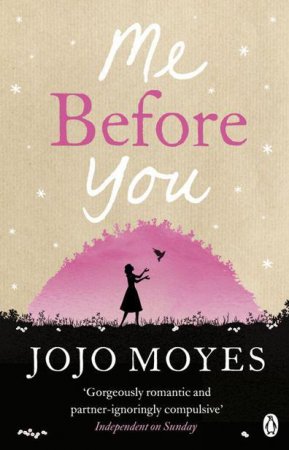 Me Before You
Me Before You After You
After You The Last Letter From Your Lover
The Last Letter From Your Lover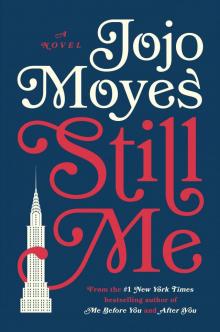 Still Me
Still Me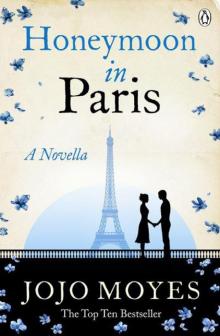 Honeymoon in Paris
Honeymoon in Paris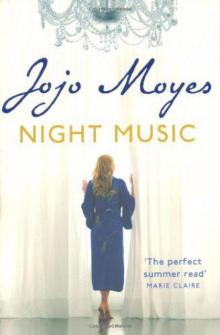 Night Music
Night Music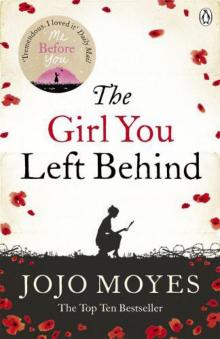 The Girl You Left Behind
The Girl You Left Behind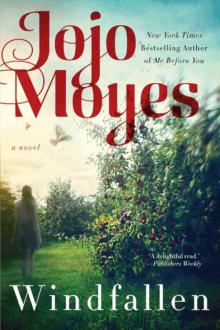 Windfallen
Windfallen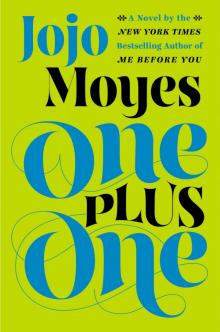 One Plus One
One Plus One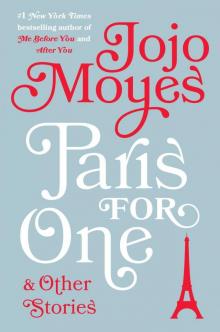 Paris for One and Other Stories
Paris for One and Other Stories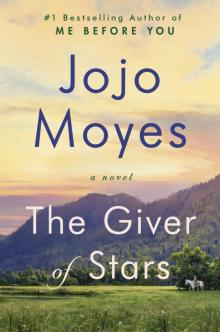 The Giver of Stars
The Giver of Stars The Ship of Brides
The Ship of Brides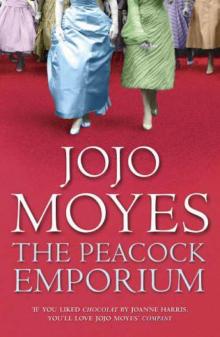 The Peacock Emporium
The Peacock Emporium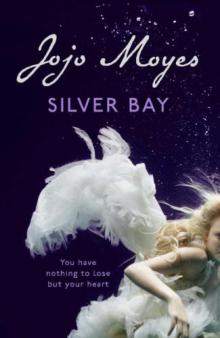 Silver Bay
Silver Bay The Horse Dancer
The Horse Dancer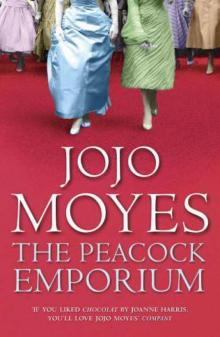 Peacock Emporium
Peacock Emporium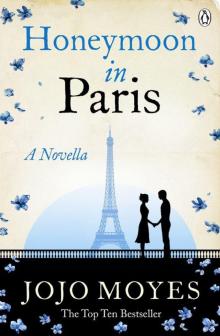 Honeymoon in Paris: A Novella
Honeymoon in Paris: A Novella Ship of Brides
Ship of Brides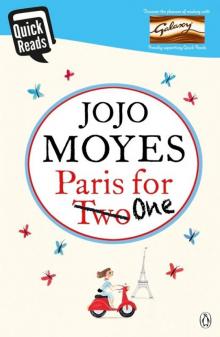 Paris For One (Quick Reads)
Paris For One (Quick Reads)